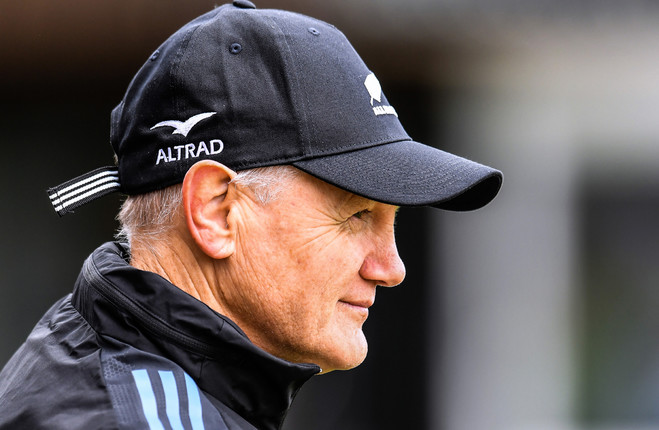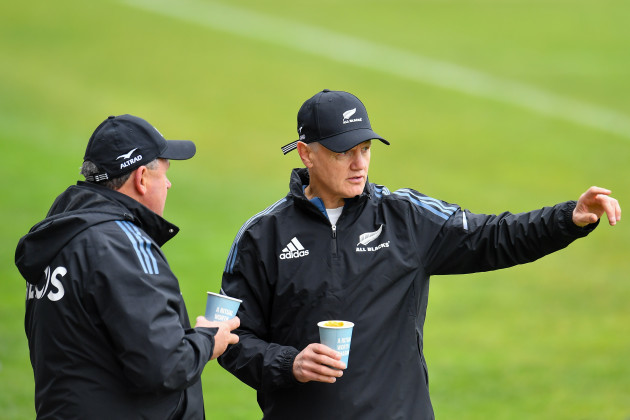A FIRST HOME defeat to Argentina last week, off the back of a lost home series to Ireland earlier in the summer, might have been the nadir for Ian Foster’s All Blacks.
New Zealand had never before lost three consecutive home games and, in all, Foster’s side were on a run of six defeats in their last eight tests stretching back to Dublin last November.
Rarely has a Kiwi side — as well as its captain, Sam Cane, and its now revolving door of coaching staff — faced such scrutiny of performance not only in their homeland, but in the world media.
Yet, there were two constants to be found amid all of the turbulence on Saturday: Foster’s starting XV for the second Argentina test which, to some controversy, was unchanged from the defeat a week prior, and the fact that the following still just about rings true of the All Blacks: you can never write them off, at the same time.
On Monday’s Rugby Weekly Extra podcast for The42 members, presenter Gavan Casey asked our analyst, Eoin Toolan, just how New Zealand managed to turn a narrow but embarrassing defeat into a rousing 53-3 victory within the space of a week.
And, on top of Argentina’s inability to rediscover the emotional pitch of their famous win in Christchurch, Toolan finally saw green shoots from New Zealand in Hamilton — and he believes the seeds were planted and watered by a man who made a similar philosophy famous in green not so long ago.
“You could see the automation in New Zealand’s game,” Toolan said. “And what that allows the players to deliver is more physicality.
“I thought, particularly around their breakdown, Scott Barrett and Sam Cane created a huge amount of physicality,” he added of the lock and back-row captain, two of the players who have been criticised for their perceived failure to do so in recent months.
But how did a supposedly weak New Zealand pack, and a side so conspicuously struggling to generate momentum from their carries, become so explosive in only a week?
“I think you’ll remember the buzzword that came out of Irish rugby for a good three years in the early days of the Joe Schmidt era was ‘clarity,’” Toolan said. “That was constantly referenced by the players: that their confidence came from clarity; that they all understood how they wanted to play, where on the pitch they were looking to exploit opposition weaknesses.
Through that clarity comes that automation where no one’s in doubt in terms of where they need to go to, no one’s in doubt in terms of their roles individually from one to 15 which, as a collective, brings that automation. That allows people to play with real aggression because there’s no ambiguity in terms of what’s required of them. I was smiling to myself during the game that you could see that shift in the New Zealand players. And I think with that clarity comes confidence and I think they’ll be a very different proposition as the year develops.
“The criticism of Joe in later years was that there was a huge degree of clarity in terms of what Ireland wanted to do but I think that the opposition probably started to understand what they (Ireland) wanted to do also,” Toolan continued. “That will be the challenge once that game model is really deeply embedded in the New Zealand, that, while there’s automation, they also have agility within that automation to be able to play a bit of heads-up rugby.
“And I think we saw signs of it, obviously, with their kicking game: there was a flexibility in terms of how they kicked.
But you could just see [Schmidt's influence] in their launch plays. We’ve said it before: the first two, three phases are so critical in the modern game and most of New Zealand’s momentum came from really good first-phase launches that put New Zealand on the front foot. And it’s a more diminutive New Zealand pack than we’ve typically seen but if the first phase is strong and there’s momentum, then you can play on top of opposition, use your footwork and continue that momentum.
“I was alarmed by how badly New Zealand launched, particularly in the Ireland series, and there’s definitely been a marked improvement in that area.”
Toolan and Casey also discussed South Africa’s first victory in Australia since 2013, reviewing both Rugby Championship fixtures — and previewing the rest of the tournament — exclusively for The42 members.


